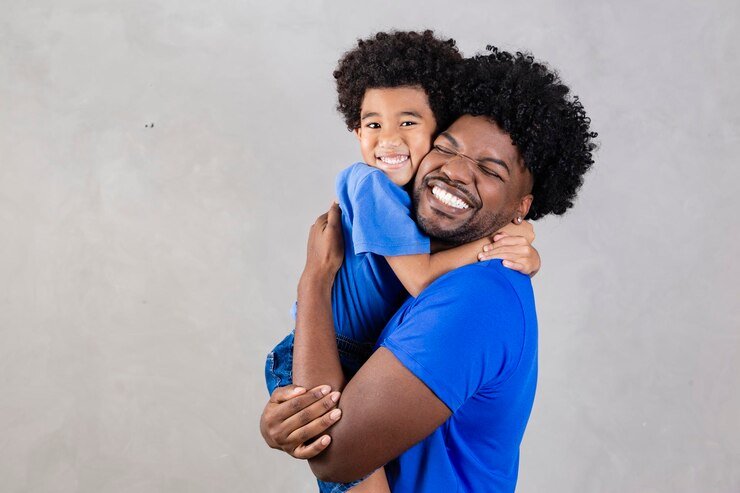Love is not just a feeling we have for our children. It is a language they need to hear, see, and experience, again and again and again. I have met adults who grew up in beautiful homes, went to the best schools, wore the best or latest clothes, and an abundance of meals, but if you asked them whether they felt loved, their answer usually boils down to no because the love they felt was implied, but rarely expressed.
In my few years of ‘mothering’, one thing i have discovered is that children don’t interpret love the way adults do. Provision is love to an adult. But to a child, love feels like presence. Like joy. Like loving correction. Like words. Like touch. Like safety.
Love Like God Does
Romans 5:8 says: “But God demonstrates His own love toward us, in that while we were still sinners, Christ died for us.” He didn’t just feel love. He demonstrated it. He expressed it. He acted on it. The God-kind of love is expressive, sacrificial, intentional, and unwavering. It is not passive or abstract. It is loud, it is visible, and it is felt.
Your Child’s Soul Is a Garden
And love is the water. You don’t just think about watering your plants, you do it. You pour. Gently. Daily. Whether the sun is out or not.
In the same way, your children need regular showers of love, not just care, not just provision. They need the actual expression, because unexpressed love is often unheard love.
I didn’t grow up with many expressions of love but I give it abundantly. Things like hugs? words of affirmation? “I love you”? They weren’t common in my world. In fact, they felt strange. So strange that I resisted them at first. But that resistance was both a blessing and a burden. By God’s grace, it protected me from clinging to the wrong people just to feel loved. But it also left me disconnected from people who genuinely cared. I struggled to give and receive love. It felt like speaking a foreign language I was never taught.
And if I hadn’t encountered the love of God, the overwhelming, undeserved, unwavering love of Our Father, I wouldn’t have been able to give love to my children. Because you can’t pour what you’ve never received.
So, this isn’t just a message, it’s a miracle:
That I can now look my boys in the eyes and say, “I love you.”
That I can hug them without flinching.
That I can raise them in an atmosphere I never had, but needed.
What Happens When Love Is Unfamiliar?
I’ve seen it too many times. Children who weren’t taught love, trained in love, or surrounded by love… When someone from the outside says, “You’re special” or “You’re beautiful,” it sounds like water in a desert. So they start chasing that voice, even if it leads them to destruction. They can’t always tell that it’s deceptive or manipulative, because they’ve never been taught what real love looks like.
And many of those children grow into adults who either crave attention or resist affection. Both are cries from the same wound. Let’s not raise children who don’t know what to do with kindness. Let’s not raise children who can’t differentiate between love and lust, between validation and manipulation. Let’s raise children so secure in our love that they can smell a counterfeit from a mile away.
Practical Ways to Express Love
I say this especially to Nigerian parents, because culturally, we tend to be more expressive with correction than affection, especially with our sons. No child is allergic to expressions of love. It’s not a crime or a sign of weakness or weird to hug your sons. If anything, it loosens the soil of their heart so that the truths you teach them can grow.

So, Hug them. Squeeze them tight
Mothers and especially fathers, please hug your sons and say “I love you” often, even if it feels awkward at first.
Tuck them in at night, read the stories they like to them,
Write them little notes.
Tell them what you admire about them.
Sing with them , even off-key.
Dance with them in the parlour and in the rain
Sit with them without correcting.
Run up and down the stairs with them
Laugh with them, not at them.
Apologize when you’re wrong and hug them when you discipline them
And then hug them so more and a little more!
These things may seem small, but they build trust. When a child trusts that they are loved, they come to you, not the world, to define love.
Love Them on Their Worst Days Too: Model the God-kind of love.
The God-kind of love is not the kind that loves only when they behave well. It is not the kind that withholds affection because they spilled water or brought home a poor grade. It is unconditional kind, like God’s love for us.
Romans 8:38–39 says: “For I am convinced that neither death nor life, neither angels nor demons, neither the present nor the future, nor any powers, neither height nor depth, nor anything else in all creation, will be able to separate us from the love of God that is in Christ Jesus our Lord.“
That’s the kind of love your child should feel from you.
A love they can’t outrun.
A love that pursues.
A love that speaks.
A love that stays.
God doesn’t just think about His love for us, He says it. Repeatedly. Boldly. Tenderly.
Let’s be vocal too. Say it with your words. Say it with your face. Say it with your touch. Say it with your actions. Say it with your patience. Love them loudly, even on their worst days, because those are the days they need it the most.
Let your home be their safest place. Let your voice be their first echo of God. And let your love, like God’s love, never be in question.






